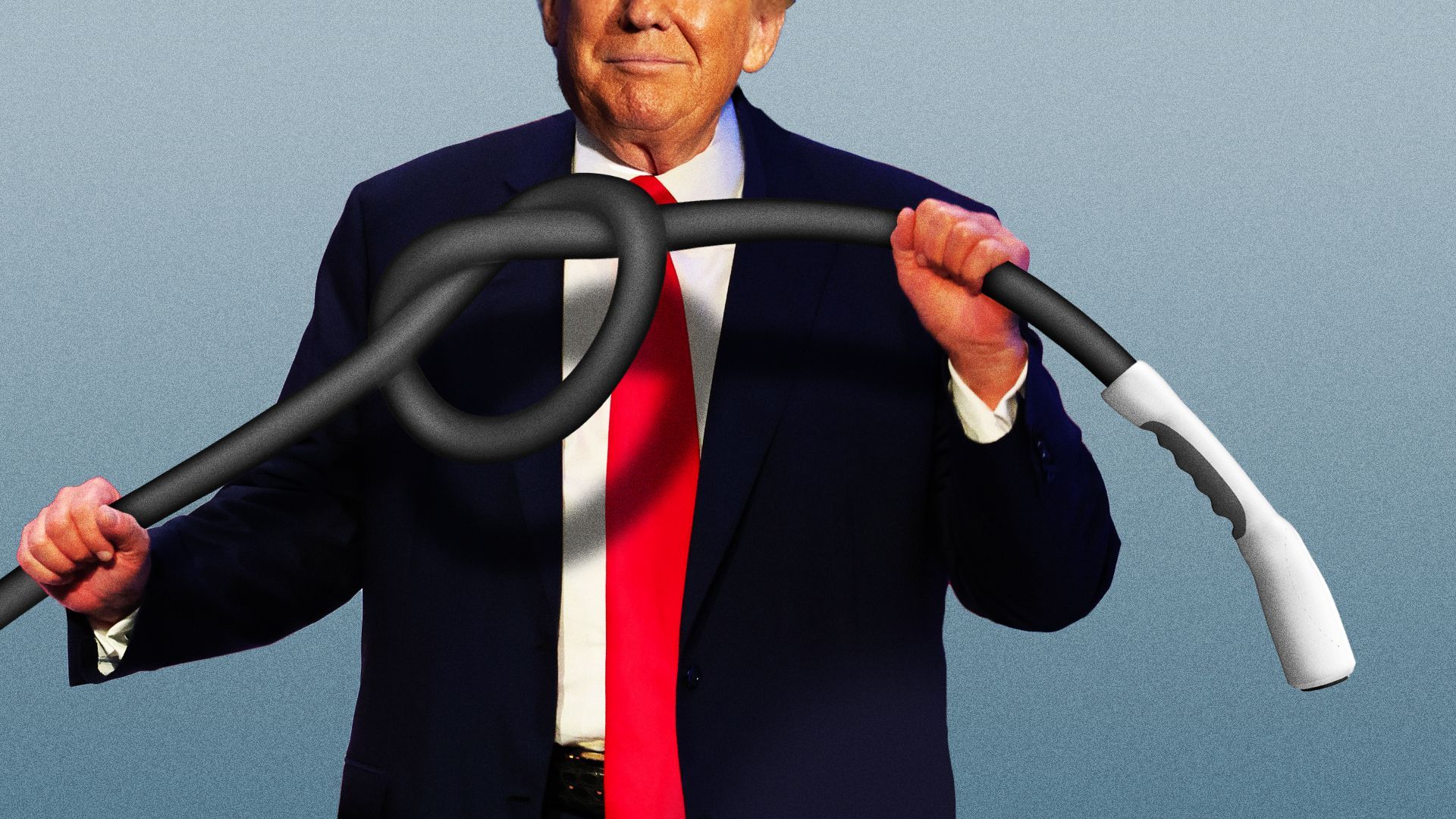EV Mandate Backlash: Car Dealerships Increase Resistance

Table of Contents
The increasing adoption of electric vehicles (EVs) is driving a significant shift in the automotive industry, spearheaded by government mandates aimed at reducing carbon emissions. However, this transition is not without its resistance. A significant EV mandate backlash is brewing among car dealerships, who are voicing concerns and actively pushing back against these EV mandates. This article delves into the reasons behind this growing resistance and explores its potential impact on the future of the automotive landscape.
Financial Concerns Fueling Dealer Resistance
The transition to selling and servicing EVs presents significant financial hurdles for many dealerships, fueling the EV mandate backlash. These concerns are central to the resistance and threaten the viability of some dealerships if not adequately addressed.
High Initial Investment Costs
Dealerships face substantial upfront costs to adapt to the EV market. This represents a major component of the EV mandate backlash.
- Expensive charging equipment: Installing fast-charging stations requires a considerable investment, often running into tens of thousands of dollars per station, depending on the power output and number of charging points.
- Need for specialized tools and training: EVs require specialized tools and diagnostic equipment, different from those used for gasoline-powered vehicles. Training technicians on these new technologies adds to the financial burden.
- Lack of government subsidies for infrastructure upgrades: While some government incentives exist, many dealerships report that they are insufficient to cover the significant costs associated with upgrading their facilities to accommodate EVs.
The financial burden is substantial. For instance, a medium-sized dealership might need to invest $100,000 or more to install just a few fast chargers and train its staff, a significant upfront cost that impacts profitability, especially in the face of already thin margins.
Lower Profit Margins on EVs
Dealerships are also facing lower profit margins on EVs compared to gasoline-powered vehicles (ICE vehicles), contributing significantly to the EV mandate backlash.
- Reduced service revenue: EVs have fewer moving parts than ICE vehicles, leading to less frequent and less complex maintenance needs, resulting in reduced service revenue for dealerships.
- Higher upfront costs for inventory: The higher purchase price of EVs compared to gasoline cars means dealerships need more capital tied up in inventory.
- Competitive pricing pressures: The intense competition in the EV market forces dealerships to offer competitive pricing, further squeezing profit margins.
Analysts predict that the current profit margins on EV sales are significantly lower than those on traditional vehicles, creating a considerable financial challenge for dealerships struggling to balance the investment required for EV infrastructure with the lower profitability of EV sales.
Challenges in EV Sales and Consumer Adoption
Beyond financial concerns, dealerships face significant challenges in selling and servicing EVs, further fueling the EV mandate backlash. Consumer hesitancy and market uncertainties add complexity.
Consumer Concerns and Range Anxiety
Consumer adoption of EVs remains slow, partially due to persistent concerns about EVs. This contributes to the ongoing EV mandate backlash.
- Lack of widespread charging networks: The limited availability of public charging stations, especially in rural areas, creates "range anxiety" among potential EV buyers.
- Consumer perception of limited driving range: Many consumers are concerned about the driving range of EVs, particularly compared to gasoline cars.
- Concerns about battery degradation and replacement costs: The long-term cost of battery replacement and the potential for battery degradation over time are deterrents for some consumers.
Market research consistently shows that range anxiety and charging infrastructure concerns are major obstacles to wider EV adoption, indirectly impacting dealership sales and contributing to the backlash against mandates pushing rapid EV adoption.
Inventory Management and Demand Fluctuations
Managing EV inventory also presents unique challenges for dealerships, adding to the resistance against EV mandates.
- Difficulties in predicting EV demand: The demand for specific EV models can fluctuate significantly, making accurate inventory forecasting difficult.
- Inventory storage space limitations: Storing EVs might require modifications to existing facilities, especially if dealerships need to accommodate larger charging infrastructure.
- Complexities of managing different vehicle types: Dealerships must manage both ICE and EV inventories, leading to increased logistical complexities.
Efficient inventory management is critical for profitability. The unpredictability of EV demand combined with the need for specialized storage and handling creates additional strain on dealerships and contributes to the growing EV mandate backlash.
Lack of Government Support and Policy Clarity
The perceived lack of adequate government support and clear policies further fuels the EV mandate backlash among dealerships.
Insufficient Incentives for Dealerships
Dealerships argue that government incentives are insufficient to offset the transition costs associated with embracing EVs.
- Inadequate financial support for charging station installations: The available grants and rebates often fall short of covering the actual costs involved.
- Lack of tax breaks or subsidies for training programs: The expense of training technicians on EV maintenance is not sufficiently supported by government initiatives.
- Complex application processes: The application processes for government incentives are often cumbersome and time-consuming, further discouraging dealerships.
Dealerships need significant financial support to bridge the gap between the cost of transitioning to EVs and the current revenue streams. The perceived lack of adequate support adds significantly to the EV mandate backlash.
Unclear Regulations and Shifting Mandates
Constantly evolving EV mandates create uncertainty and hinder long-term planning for dealerships.
- Frequent changes in emission standards: The frequent revisions in emission standards make it challenging for dealerships to invest in long-term infrastructure improvements and inventory planning.
- Inconsistent regulations across different states or regions: Variations in regulations across different states complicate compliance and make nationwide expansion difficult.
- Lack of predictable policy frameworks: Dealerships need clear and consistent policies to make informed business decisions regarding EV investments.
The unpredictability of regulations adds another layer of complexity to an already challenging situation and adds fuel to the EV mandate backlash.
Conclusion
The resistance from car dealerships to EV mandates is a multifaceted issue stemming from financial concerns, market challenges, and a perceived lack of government support. Addressing these concerns through increased incentives, clear policy frameworks, and better consumer education is crucial for a smooth transition to a sustainable automotive future. The ongoing EV mandate backlash highlights the need for a collaborative approach involving governments, manufacturers, and dealerships to ensure a successful transition to electric vehicles. Understanding the challenges and working towards solutions will be key to navigating this pivotal moment in the automotive industry. Ignoring the concerns driving this EV mandate backlash could lead to significant disruptions in the automotive market and slow the overall adoption of electric vehicles.

Featured Posts
-
 Gauff Advances To Italian Open Final After Three Set Victory Over Zheng
May 26, 2025
Gauff Advances To Italian Open Final After Three Set Victory Over Zheng
May 26, 2025 -
 Best Nike Running Shoes 2025 A Comprehensive Buyers Guide
May 26, 2025
Best Nike Running Shoes 2025 A Comprehensive Buyers Guide
May 26, 2025 -
 Andrew Forrest And Rio Tinto Clash Over Pilbaras Environmental Impact
May 26, 2025
Andrew Forrest And Rio Tinto Clash Over Pilbaras Environmental Impact
May 26, 2025 -
 10 New Orleans Inmates Successful Jail Escape A Detailed Account
May 26, 2025
10 New Orleans Inmates Successful Jail Escape A Detailed Account
May 26, 2025 -
 Cohere Fights Back Against Copyright Infringement Allegations In Us Court
May 26, 2025
Cohere Fights Back Against Copyright Infringement Allegations In Us Court
May 26, 2025
